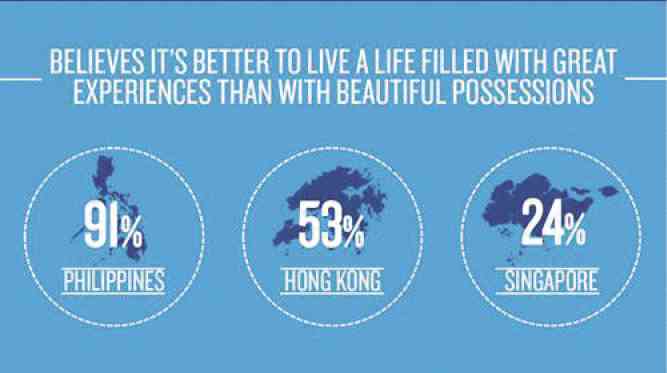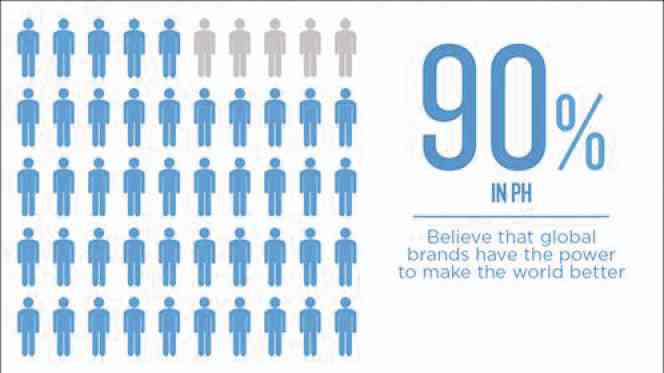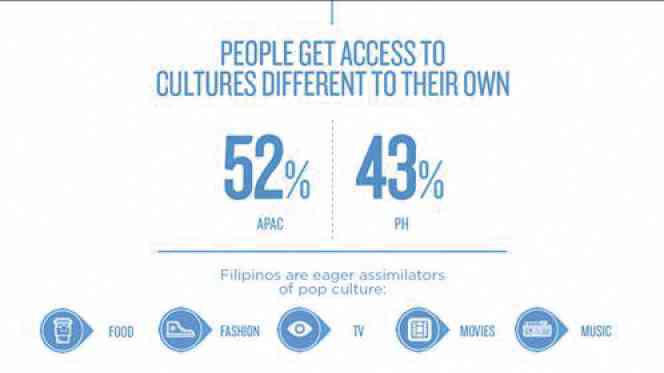What brands need to know to thrive in the ‘new globality’

Experiences matter more than material possessions—more so to the Filipino consumer. (Source: The Truth About Global Brands, McCann Worldgroup) Image courtesy of McCann Worldgroup Philippines
As the Philippines hosted the 23rd Asia Pacific Economic Cooperation (Apec) Summit, and the region covered by the Association of Southeast Asian Nations marked the beginning of the Asean Economic Community’s integration, one question surfaced among the local business community: Are Philippine businesses ready for the world?
While there are policy and regulatory complexities that we cannot address here, one reality has made itself clear: we have seen more changes in business in the last four years than in the past 50 years combined.
What worked for businesses and brands 10—even five—years ago, will no longer work today.
This applies even more so to a country like the Philippines, which has experienced unparalleled economic growth over the past few years and which is in the midst of demographic and technological shifts that we in McCann call the “New Globality.”
Truth study
We dove deep into this in McCann Worldgroup’s latest proprietary “truth study” called The Truth About Global Brands.
Here, we share snapshots of this truth study and what it means for your business amid an increasingly complex and connected world.
To understand the “New Globality,” let us first understand the world and the context in which businesses and brands now operate.
If in the past, businesses and brands have had the luxury of being able to push their messages to consumers—albeit, admittedly, in a one-way conversation—today’s consumers are savvier and more connected than ever before, shifting the balance of the marketing conversation from one that was brand-centric to one that is now consumer-centric.
Four key changes in our landscape have contributed to this.
First is the globalization of Filipinos thanks to the overseas Filipino worker phenomenon, the rise of the business process outsourcing (BPO) industry, and the accessibility of travel.
This has exposed more Filipinos to a global world view and a broader palette of influencers.
Second is the shift toward a younger demographic.
Over half (55 percent) of the Philippine population today is below 30—a generation whose values and behavior are quite different from those of previous generations.
They don’t take “brand loyalty” blindly, and they are far savvier at dealing with brands than the generations before them.
Third is the rise of mobile devices, Internet access, and social media platforms that have made it easy—sometimes even free—for a consumer to be more globally connected, and therefore exposed to all kinds of brand experiences from everywhere in the world. Last, and related to all these, is the media and content explosion—much of which are created by consumers themselves.
Our new reality shows a multi-tasking consumer with ultra-divided attention, often consuming more content given the same hours in a day, with multiple screens on at the same time.
All brands—whether local, regional, or global—now live in this New Globality, where popular culture dominates in various shapes and forms.
And for brands to earn attention and interest, they will have to fight for their own “share of culture.”
Truth #1: Every local action can have a global reaction
In the New Globality, there is no longer such a thing as a purely local brand.
The ubiquity of social networks and digital marketing platforms exposes a brand and its messages to an audience beyond its intended geographical scope.
What a brand does—whether big or small, right or wrong—can instantly be captured and shared with millions of other people through a mobile phone.
What does this mean for a brand like yours? More than ever, brands must be true to their promise at every possible point of contact with the consumer.
In an earlier research that we conducted, 81 percent of respondents said, “If a brand lets me down in some way, I will make it a point to tell my friends about it.”
Likewise, 90 percent said, “If a brand impresses me in some way, I will make it a point to tell my friends about it.”
Consistency is key, because even just a single misstep—whether intended or not—can easily be escalated into a scandal. Conversely, a good deed of a brand—whether intended or not—can easily garner global approval.
And this applies to you whether you are a multinational, a large local company, or even just an online seller.
As long as you have a digital presence that can extend beyond a particular geographic scope, you have the potential for a global audience (with global consequences).
Truth #2: Connecting with consumers today means orchestrating integrated, cohesive experiences that matter.
The era of simply pushing a message to a consumer is over.
We must understand and appreciate that consumers are complex human beings with a wide range of needs and wants—and, especially for millennials, for whom experiences matter more than just material possessions.
We therefore cannot simply “market” to them in a linear fashion, but neither can we attempt to be present in all marketing platforms and think that our ubiquity is what will connect us to consumers.
In the New Globality, we must be able to look at consumers as part of dynamic communities, and at marketing as part of an ecosystem—instead of distinct silos that can be treated independent of each other.
We must seek to understand: In which space can connections be the most engaging? In which platforms will our message and experience make a difference? What experience can best address the New Globality that my brand and our consumers are in? With what orchestration can I involve my entire marketing ecosystem?
Truth #3: The medium isn’t the message; the meaning is the message
In a world that is increasingly globalized and connected, where brands cross borders and where there’s a tendency for people and brands alike to drown in the proverbial “sea of sameness,” the brands that will stand out—whether local or global—are those that will enrich the local culture where it operates, and where they bring meaning to people’s lives.
In The Truth About Global Brands, a whopping 85 percent of respondents—and 89 percent from the Asia Pacific region—believe that “global brands have the power to make the world better.”
This is even more true in the Philippines, where 90 percent of respondents believed this way, and where 89 percent of respondents “believe that global brands have the ability to make greater positive change than the government.”
It seems to be a tremendous responsibility thrust upon the shoulders of brands, but the truth is that brand trust is high, and brands can leverage on that trust to build a more lasting relationship with its consumers.
This is even more true for the Philippines, where 73 percent of respondents claimed to trust “mostly global brands” (versus the global average of 57 percent).
The bottom line is: if your brand doesn’t make people feel better about their lives, it doesn’t matter much what you put around it.
In the New Globality, the medium isn’t always the message. For most successful brands, the meaning is the message. (The author is chair and CEO of McCann Worldgroup Philippines)
















